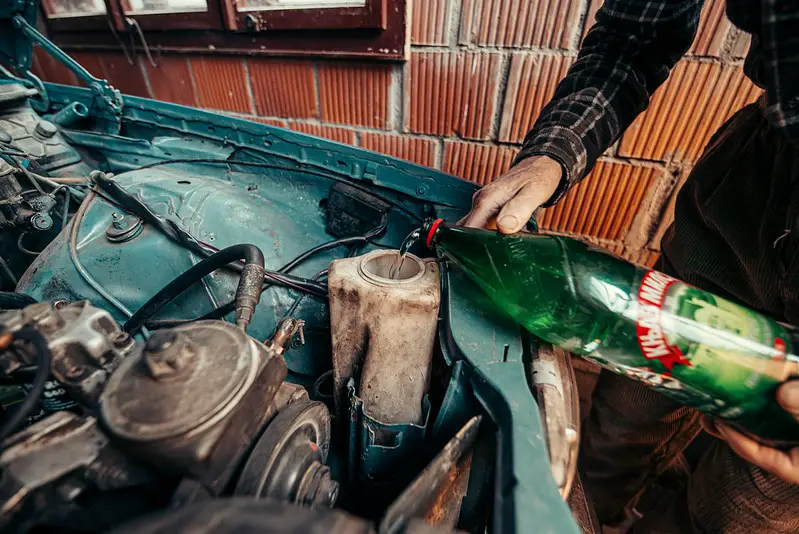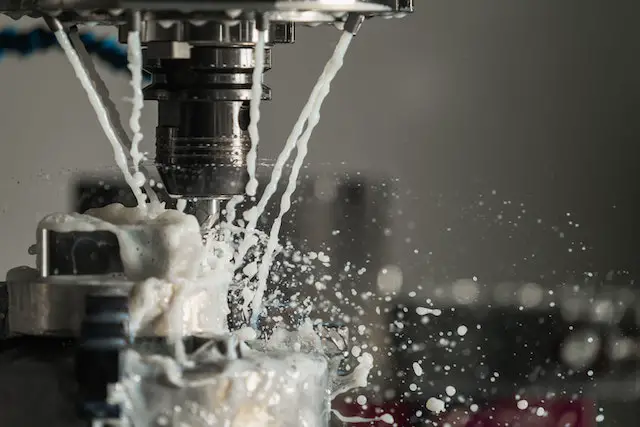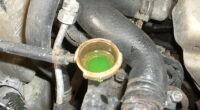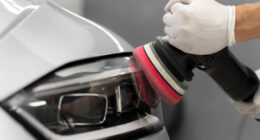Coolant helps regulate the temperature of your car’s engine while antifreeze prevents water from freezing in cold temperatures. While they have different functions, it’s crucial to use both correctly and choose the right products for your vehicle.
What is coolant?
(Photo By Henri Bergius on Flickr)

Coolant, also known as engine coolant or radiator fluid, is a liquid that circulates through your car’s engine to maintain safe operating temperatures. It transfers heat away from the engine and into the surrounding air via the radiator.
In addition to its cooling properties, coolant also contains additives that help prevent corrosion, lubricate water pump seals, and keep debris from building up in your engine.
There are two main types of coolant: ethylene glycol-based and propylene glycol-based. Ethylene glycol-based coolants offer better heat transfer capabilities but are more toxic than propylene glycol-based alternatives which are mainly used for newer vehicles with aluminum engines since they cause less damage.
It’s important to note that you should always use the type of coolant specified by your vehicle’s manufacturer in order to ensure proper performance and avoid potential damage caused by using incompatible fluids.
What is antifreeze?
(Photo By Nenad Stojkovic on Flickr)

Antifreeze is a type of coolant that is designed to lower the freezing point and raise the boiling point of engine coolant. This helps prevent the engine from overheating or freezing in extreme temperatures, which can cause serious damage to your vehicle.
Antifreeze is typically made with ethylene glycol or propylene glycol, along with additives that help protect against rust, corrosion, and scale buildup. These additives are important for maintaining the health of your engine over time.
One key difference between antifreeze and regular coolant is that antifreeze contains a higher concentration of glycols, which gives it greater freeze protection. However, this also means that it needs to be diluted with water before use.
It’s important to choose the right type of antifreeze for your vehicle based on factors like make and model, climate conditions where you live, and manufacturer recommendations. Using the wrong type of antifreeze can lead to engine failure or other problems down the line.
Antifreeze plays a crucial role in protecting your car’s engine from extreme temperatures and ensuring its longevity.
Coolant Vs. Antifreeze – Key differences
Coolant and antifreeze are two essential fluids that are used in an automobile’s cooling system. While these terms are often used interchangeably, there is a significant difference between them.
Coolant is a type of liquid that circulates through the engine and helps regulate its temperature by absorbing heat. It contains water, additives, and corrosion inhibitors which help prevent rust and scale formation inside the cooling system.
Antifreeze, on the other hand, is a type of coolant that has been formulated to withstand extremely low temperatures without freezing. It typically contains ethylene glycol or propylene glycol as its base ingredient along with various additives such as corrosion inhibitors.
One key difference between coolant and antifreeze lies in their function. Coolant mainly serves to maintain the engine’s operating temperature while antifreeze protects it from extreme cold temperatures during winter months.
Another key difference between them lies in their composition. Antifreeze typically contains higher concentrations of ethylene glycol or propylene glycol than regular coolant which gives it better anti-freezing properties.
While both coolant and antifreeze serve similar purposes within an automobile’s cooling system, they have distinct differences based on their composition and functions. Therefore choosing the right one for your car depends upon various factors such as climate conditions where you live, driving habits etc. So always choose wisely!
How to choose the right coolant for your car
Choosing the right coolant for your car is essential to keep it running smoothly. The first thing you need to check is the type of engine in your car. If you have an aluminum block, then you will need a coolant that has silicates or phosphates. This type of coolant helps prevent corrosion and pitting on aluminum surfaces.
Next, consider the climate where you live. If you live in a colder area, then a coolant with ethylene glycol is ideal as it provides excellent protection against freezing temperatures. However, if you reside in a warmer region, then propylene glycol-based coolants are more suitable.
Additionally, pay attention to the color coding of different coolants available in the market and choose one that matches your vehicle’s requirements. You may also want to consider purchasing premixed coolants instead of concentrated ones as they require less dilution and are easier to use.
Always follow manufacturer recommendations when selecting any automotive fluid including coolant for your car model year and make.
How to choose the right Antifreeze for your car
When it comes to choosing the right antifreeze for your car, there are a few important things to keep in mind. First and foremost, check your vehicle’s owner manual or consult with a trusted mechanic to determine what type of antifreeze is recommended for your specific make and model.
Next, consider the climate in which you’ll be driving. If you live in an area with extreme temperatures, such as very hot summers or frigid winters, you may need to choose an antifreeze that is specifically formulated for those conditions.
It’s also important to pay attention to the color of the antifreeze. Different colors indicate different types of formulations and mixing incompatible types can cause damage to your engine. Be sure that any new antifreeze matches the current color already in use.
Look for high-quality products from reputable brands. Don’t cut corners on price when it comes to something as essential as engine coolant – investing in a quality product now could save you costly repairs down the line.
How long does antifreeze last?
Antifreeze is a vital component of your car’s cooling system. It helps regulate the engine temperature and prevent overheating, especially during extreme weather conditions. But how long does antifreeze last?
The lifespan of antifreeze varies depending on several factors such as the type of coolant used, climate conditions, driving habits, and maintenance practices. Generally, manufacturers recommend changing your vehicle’s coolant every two to five years or after reaching a specific mileage.
However, extended use of antifreeze can cause contamination and lead to its breakdown over time. This could result in reduced performance levels and increased wear and tear on parts like water pumps and radiators.
In addition to regular maintenance checks for leaks or cracks in the cooling system that could allow air into it causing corrosion leading to reduced effectiveness of the coolant itself.
Therefore it is essential to follow manufacturer recommendations based on usage patterns while checking for any warning signs such as sweet-smelling steam coming from under the hood indicating possible issues with an aging engine or leaking seals which would require immediate attention by a mechanic
The benefits of coolant and antifreeze
Coolant and antifreeze are essential for maintaining the optimal temperature of your car. But did you know that they offer other benefits as well? Let’s take a closer look at some of the advantages of using coolant and antifreeze.
Firstly, both coolant and antifreeze contain additives that lubricate the water pump, which helps to prolong its lifespan. This is because these additives prevent corrosion from forming on the metal surfaces within your car’s cooling system.
Secondly, adding coolant or antifreeze to your vehicle can help improve fuel efficiency. By ensuring that your engine stays at an optimal temperature, it prevents unnecessary strain on the engine, thus reducing fuel consumption.
Thirdly, using high-quality coolants or antifreezes can also enhance overall performance by preventing overheating issues. Overheating can cause major damage to an engine resulting in costly repairs; however by regularly checking levels and changing out fluids when needed this problem can be avoided altogether.
Another benefit of using coolants or antifreezes is their ability to protect against freezing temperatures during winter months . Antifreeze contains chemicals that lower its freezing point so even when outside temps drop below zero degrees Fahrenheit , vehicles remain functioning optimally without concern over cracked pipes or frozen engines .
While keeping engines running at optimal temperatures may be their primary function there are many additional benefits associated with regular usage of quality coolant/anti freeze products!
Featured Image By – Daniel Smyth








